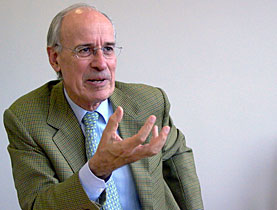President of swissinfo promotes Russian site

Renzo Respini, outgoing president of swissinfo's board, has overseen a period of great change at swissinfo, including a change in media and the threat of closure.
He says that swissinfo’s multilingual journalistic content and mission to explain Switzerland abroad is an essential mandate.
The planned dismantling of swissinfo, a unit of the Swiss Broadcasting Corporation (SBC), triggered protests by the Organisation of the Swiss Abroad and met opposition in parliament.
In June 2005 the Senate approved a proposal by Filippo Lombardi to maintain swissinfo. The other parliamentary chamber, the House of Representatives, followed suit.
As part of the new law on radio and television, parliament in 2006 decided that at least half of swissinfo’s funding should come from the government, the rest from SBC licence fees.
swissinfo: In 2000 the government appointed you president of Swiss Radio International and then head of swissinfo’s committee. How would you assess this time, which included changing from radio to internet?
Renzo Respini: First of all we were Swiss Radio International, then swissinfo/SRI and now swissinfo – all these name changes are symbolic of what has happened in the past years.
As with the other units of the Swiss Broadcasting Corporation, we were faced with an important technological change – the move from shortwave radio to a multimedia internet site – within the framework of a specific mandate, namely that of keeping alive the links with the Swiss abroad and of telling the world about Switzerland.
swissinfo has therefore had to adapt its product to this new communication platform. And I think we can say we’ve achieved our objective.
swissinfo: What is your opinion of swissinfo’s new mandate for 2007-2011 – a multimedia, multilingual and interactive product destined for the Swiss abroad and an international public?
R.R.: Switzerland could not exist without foreign countries. Ours is a special nation, with very particular forms of democracy, its own tradition and political customs, which deserve to be explained and understood beyond our frontiers. This is an essential part of the mandate.
We are proud to be Swiss, proud of our political system and of our talents – all characteristics that are interesting for overseas because Switzerland is often misunderstood abroad and our image suffers.
swissinfo’s other mandate is to act as a link between Switzerland and the more than 600,000 Swiss abroad who are very attached to their home country. This was clearly illstrated recently when swissinfo’s very existence was in doubt.
swissinfo therefore has a potential for growth and for increasing dialogue between expatriates and Switzerland.
swissinfo: What role can swissinfo play in the economic and image promotion of Switzerland? Where can improvements be made?
R.R.: swissinfo already does a lot in this area through its journalistic content, but it could still do more. It would be good to offer a site in Russian, for example.
Russia has long been a culturally relevant country. It is currently undergoing a period of great economic growth and is seeking to normalise its relations with the west.
swissinfo: At one point there was the intention to cut swissinfo down to the national languages and English. What would have been the consequences?
R.R.: Crises are never easy, but difficult periods also often bring along positive elements. The difficult situation faced by swissinfo resulted in the awareness how much of an asset it is to have multicultural and multilingual journalists.
There are around 20 nationalities working at swissinfo in nine languages, representing at least nine different cultures – an incredible source of richness for our country and a great potential for explaining the real Switzerland beyond our borders.
Nowadays the key thing for the future is to understand how others think. Many, most people in fact, speak English, but not all think in English. Multicultural journalists help swissinfo to understand how others think. This is important for presenting our country and its particularities.
swissinfo: Are there synergies that could still be made between swissinfo and other institutions that also deal with Swiss relations abroad?
R.R.: swissinfo already actively collaborates with other SBC units, even if this cooperation could ultimately be improved. This also applies to the entities which promote the interests and image of Switzerland worldwide such as Presence Switzerland, Switzerland Tourism and the Arts Council, Pro Helvetia.
There are also lots of Swiss non-governmental organisations active all over the world in the aid and development sector. It would be a great success if swissinfo managed to become the reference media for all these associations.
swissinfo-interview: Andrea Arcidiacono and Andrea Clementi
Renzo Respini was born in Sorengo in Italian-speaking Ticino in 1944. He studied law at Geneva University, and afterwards qualified as a lawyer and notary.
In his professional career, Respini has worked in the federal administration in the Swiss capital, Bern, and as a lawyer and magistrate in Ticino.
From 1983-95, Respini was a member of the Ticino cantonal government. From 1995-9 he was a senator for centre-right Christian Democratic party.
Respini is a partner in a law firm in Lugano, Ticino, and sits on several company and cultural associations boards.

In compliance with the JTI standards
More: SWI swissinfo.ch certified by the Journalism Trust Initiative

You can find an overview of ongoing debates with our journalists here. Please join us!
If you want to start a conversation about a topic raised in this article or want to report factual errors, email us at english@swissinfo.ch.